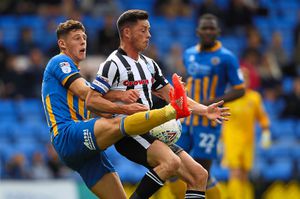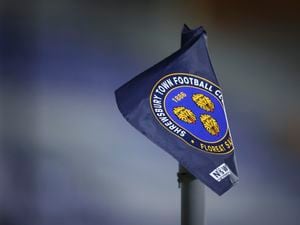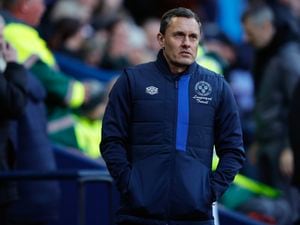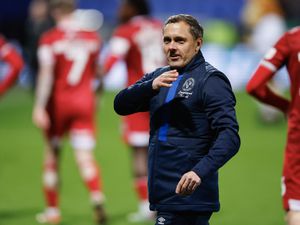Brian Caldwell explains Shrewsbury Town's transfer remodelling
Chief executive Brian Caldwell revealed Shrewsbury Town’s transfer model has them shopping in a ‘different supermarket’ to a lot of League One.
The unsuccessful summer transfer window of 2016 was Micky Mellon’s final off-season in charge at the Meadow.
Mellon, whose Tranmere side were downed 6-0 on his first return to Shrewsbury last week, signed a host of League One proven players in the summer before his departure and, since that time, Town have remodelled their approach of making signings.
Shrewsbury spent almost £600,000 on signings this summer. They also made £2million, once all fees are paid, in player sales.
Despite that, Caldwell insists that Shrewsbury can not compete when dealing in League One wage battles, so look to be smarter and seek bargains elsewhere.
But it is in the profile of the 16 new additions that Town have tinkered. John Askey’s signings – and Paul Hurst’s previously – were younger, inexperienced players. Some were from non-league, some had barely tasted Football League.
Caldwell told the Shropshire Star: “Every player is a gamble, no matter where they’re from. There was a keenness for experienced League One players. Since then, looking at last season, players have come from lower levels with a hunger to play at a higher level.
“Last season proved that if you get a team of players together willing to work hard then you can be successful. The chairman discuss it all the time, we always need to shop in a different supermarket.
“If there’s a striker in League Two scoring goals every other week, the chances are another League One club will pay more than we can. That’s a fact of life, we’ve got a wage structure and we’ll always keep to it. That’s why our finances are in such good state.
“We’re realistic enough to realise that somebody will be able to offer far much than our wage budget can afford.”
Mellon’s final Shrewsbury signings included the likes of Adam El-Abd, Jim O’Brien, Ryan McGivern, Olly Lancashire, Louis Dodds and Gary Deegan. McGivern, at 26, was the youngest of that crop.
But all six had extensive experience of playing in the third tier.
Jon Nolan, Toto Nsiala, James Bolton, Abo Eisa and Ollie Norburn are more recent examples of purchasing talent lower down the pyramid in a bid to progress them.

Town saw off interest in the signatures of Eisa, Norburn, Fejiri Okenabirhie, Josh Laurent and the loan signing of Greg Docherty from Rangers, as those individuals saw Town as a pathway to progress.
Caldwell continued: “Therefore it’s important for us to get players who’ve been overlooked or players who have played for the manager before – who they trust and know.
“What you want is players who aren’t coming down. Players who are on the up. Of an age to go and develop and do a good job in League One.
“Most of our signings, again this year, have come from lower league. If they’ve got a will to work hard they can be successful because they’re trying to prove a point to themselves, the fans, manager and everyone that they can play at a higher level.”

Current Meadow boss Askey has struggled to find a winning formula so far, with just two wins from 12 games. Caldwell added that a transitional period, with such vast changes in players and management, needs patience.
He said: “It was always going to be difficult this year because of what happened last season.
“Everybody remembers the success we had, finishing third and winning every week. You talk about a mentality of players getting used to winning.
“But the fans get used to that as well, we all get used to long unbeaten runs and winning more often than we don’t.
“Therefore, when there is a transitional period, you do have to be patient. The team have been playing well, there’s still not a team that I’ve thought ‘they’re much better than us.’
“It’s always hard to be patient because everyone wants to win every week. There’s always a frustration right through the club, from the chairman, manager, staff, everybody.
“We all feel it when we’ve lost or drawn a game when we probably should have won it.
“That’s difficult every week but we know football can turn in very short periods. Winning is something that can change the dynamic in the changing room.”





